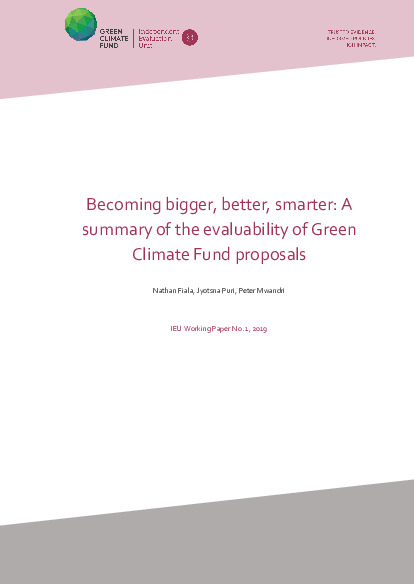Becoming bigger, better, smarter: A summary of the evaluability of Green Climate Fund proposals
The goal of the GCF is to support a paradigm shift towards low-carbon, high-resilience pathways. It is thus important to understand if such a paradigm shift is occurring, and, if so, to measure the extent to which the GCF has contributed to this overall result. We review 93 proposals funded by the GCF and assess their ability to credibly report their impacts, efficiency and effectiveness, in an evidencebased and robust way.
There are two main aims of the study: The first is to assess the quality of the proposals for the funded projects that the GCF has approved and is supporting currently so that subsequent project managers are able to produce stronger proposals that have a higher likelihood of success and in measuring results. The second is to inform the GCF investment criteria and to introduce evidence-based learning opportunities into GCF projects and processes, to inform the implementation and overall impact of GCF resources.
Using a stoplight indicator across multiple categories, we are able to quantify the ability of the GCF portfolios to meet these goals. We find that 80% of proposals do not have well defined theories of change, with half of all proposals not identifying possible unintended consequences of their programs. We also find that almost half of all proposals have the potential to identify and measure causal change, but only one-fourth of the proposals include a discussion about economic analyses that they will carry out. Although there is potential for these measurements to occur, 68% of the proposals either do not discuss methods for measuring causal change or are unclear.
Additionally, we find that while 80% of funding proposals include monitoring and evaluation “reports”, they would not be able to cover the cost of high-quality evaluations with half having no plans for baseline data collection on key variables. Almost 94% of all funding proposals do not show any awareness that (significant) bias may (will) creep in when they are measuring or claiming impacts. One-fifth of the proposals had limitations in how investment criteria were informed and/or the information level was insufficient to inform them credibly. We find that only 15% of the proposals would allow for credible measurement of progress on investment criteria.
Finally, just 13% of proposals provided impact indicators deemed capable of measuring the magnitude of causal change, with only 10% of proposals including a plan for collecting data of sufficient quality for a causal evaluation. We conclude with some recommendations for project planners.
- Introduction
- Summary of the 93 funding proposals submitted to the GCF
- Methods overview
- Key findings
- Discussion
- Standards for best-practice monitoring
- Next steps
- References
- Annex
